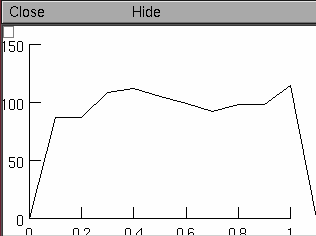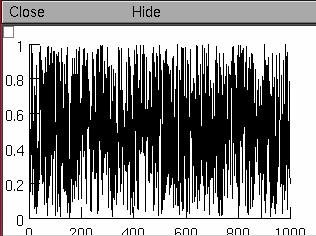mcell_ran4 · mcell_ran4_init · use_mcell_ran4
mcell_ran4¶ ↑
-
mcell_ran4()¶ ↑ - Syntax:
x = h.mcell_ran4(highindex_ptr)- Description:
A 64bit cryptographic quality random number generator. Uniformly distributed in the range 0-1. The highindex integer (0 <= highindex <= 2^32-1) is incremented by one on each call. Multiple independent streams are possible, each associated with a separate highindex with different starting values but the difference between highindex starting values should be greater than the length of each stream. The lowindex 32 bits are 0 by default and can be set using
mcell_ran4_init(). Streams can be replayed at any index (as long as the lowindex is the same).See
Random.Random123()for an even more useful alternative.This generator was obtained from Tom Bartol
<bartol@salk.edu>who uses them in his mcell program. (hence the mcell prefix) He comments: For MCell, Ran4 has the distinct advantage of generating streams of random bits not just random numbers. This means that you can break the 32 bits of a single returned random number into several smaller chunks without fear of correlations between the chunks. Ran4 is not the fastest generator in the universe but it’s pretty fast (16 million floating point random numbers per second on my 1GHz Intel PIII and 20 million integer random numbers per second) and of near cryptographic quality. I’ve modified it so that a given seed will generate the same sequence on Intel, Alpha, RS6000, PowerPC, and MIPS architectures (and probably anything else out there). It’s also been modified to generate arbitrary length vectors of random numbers. This makes generating numbers more efficient because you can generate many numbers per function call. MCell generates them in chunks of 10000 at a time.
Example:
from neuron import h, gui class McellRan4Test: def __init__(self): self.vec = h.Vector(1000) self.g1 = h.Graph() self.g2 = h.Graph() self.g1.size(0, 1000, 0, 1) self.g2.size(0, 1, 0, 150) self.highindex = 1 self.lowindex = h.mcell_ran4_init() self.mcell_func() def mcell_func(self): self.g1.erase() self.g2.erase() highindex_ptr = h.ref(self.highindex) for i in range(len(self.vec)): self.vec[i] = h.mcell_ran4(highindex_ptr) # resync the highindex (needed for the GUI) self.highindex = highindex_ptr[0] self.hist = self.vec.histogram(0, 1, 0.1) self.vec.line(self.g1) self.hist.line(self.g2, .1) self.g1.flush() self.g2.flush() def mcell_func2(self): h.mcell_ran4_init(self.lowindex) self.mcell_func() window = McellRan4Test() h.xpanel('mcell_ran4 test') h.xbutton('Sample', window.mcell_func) h.xvalue('highindex', (window, 'highindex'), 1, window.mcell_func) h.xvalue('lowindex', (window, 'lowindex'), 1, window.mcell_func2) h.xpanel()



-
use_mcell_ran4()¶ ↑ - Syntax:
previous = h.use_mcell_ran4(next) # next must be 0 or 1boolean = h.use_mcell_ran4()- Description:
h.use_mcell_ran4(1) causes scop_random in model descriptions to use the
mcell_ran4()cryptographic quality random generator. Otherwise, the low quality (but faster) linear congruential generator is used.At present (version 5.2) the default is 0.
Note that this affects the random numbers computed within model descriptions that use the functions: scop_random, exprand, normrand, and poisrand. Also note that when a model description uses set_seed(seed) and use_mcell_ran4 is true then the seed refers to the 32 bit highindex as in
mcell_ran4().
-
mcell_ran4_init()¶ ↑ - Syntax:
previous_lowindex = h.mcell_ran4_init(lowindex)lowindex= h.mcell_ran4_init()- Description:
Sets the 32 bit lowindex of the
mcell_ran4()generator. The default lowindex is 0. This affects random number streams (when use_mcell_ran4() returns 1) in model descriptions using scop_rand, etc. It also affects Random class streams that are using theRandom.MCellRan4()generator.Random.Random123_globalindex()plays a similar role as this function for theRandom.Random123()generator.